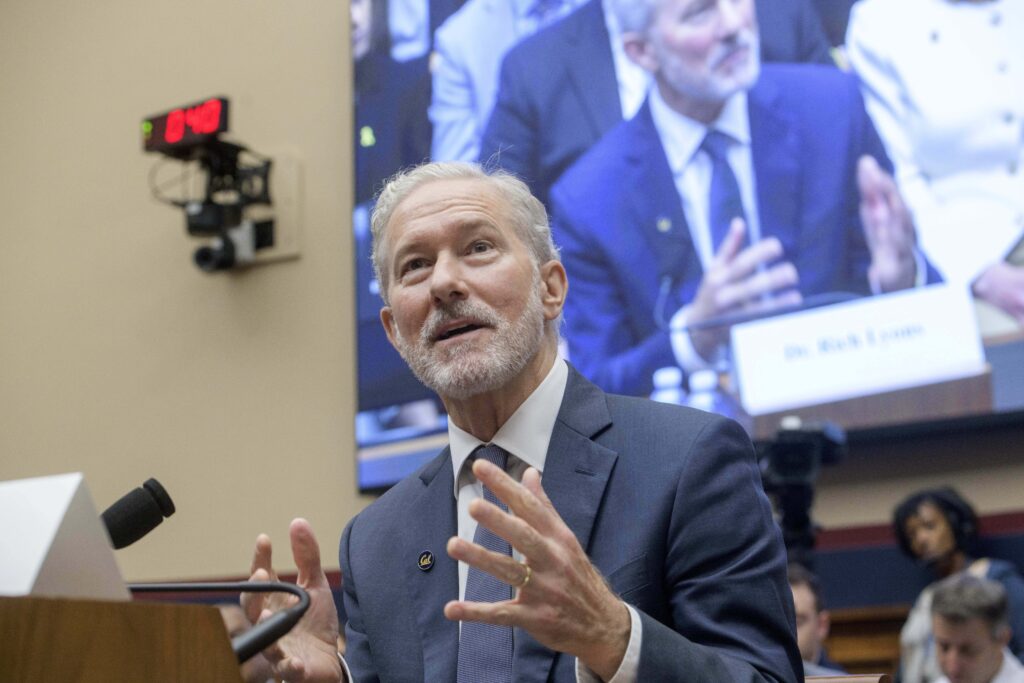
Rich Lyons, Chancellor, UC Berkeley, testifies during a House Committee on Education and Workforce Committee hearing on “Antisemitism in Higher Education: Examining the Role of Faculty, Funding, and Ideology” on Capitol Hill on July 15, 2025, in Washington, D.C.
Credit: Rod Lamkey, Jr. / AP Photo
UC Berkeley Chancellor Rich Lyons testified Tuesday in front of a U.S. House committee that his campus has “more work to do” to prevent antisemitism, though he also defended free speech and said that pro-Palestinian viewpoints are “not necessarily antisemitism.”
Lyons, along with the leaders of Georgetown University and The City University of New York, were called to face questioning at the U.S. House Committee on Education and Workforce hearing focused on antisemitism on college campuses.
It was the latest of several such hearings held since late 2023 as some Republicans contend that Jewish students have been intimidated and threatened by U.S. campus protests against Israel’s military actions in Gaza, and antisemitism is rampant in academia.
In his opening remarks, Lyons said Berkeley “unequivocally condemns antisemitism” and that the campus has an “unwavering” commitment to its Jewish students and other community members.
“I am the first to say that we have more work to do. Berkeley, like our nation, has not been immune to the disturbing rise in antisemitism. And as a public university, we have a solemn obligation to protect our community from discrimination and harassment, while also upholding the First Amendment right to free speech,” he added.
The Trump administration is currently investigating Berkeley and many other campuses over possible antisemitism and has threatened to withhold funding if it believes those campuses aren’t protecting Jewish students.
Democrats, however, have said Republicans are insincere in their concerns and are weaponizing antisemitism to attack higher education. Democrats on Tuesday also criticized Republicans for ignoring other forms of hate on college campuses, such as Islamophobia.
Like many campuses across California, UC Berkeley was the scene of pro-Palestinian protests in spring 2024, when students there erected an encampment that stayed up for weeks. However, the encampment was dismantled in May after protesters reached an agreement with then-Chancellor Carol Christ, and the campus avoided violent conflicts that besieged some other campuses, including UCLA.
Lyons, who took over as chancellor last summer, faced less scrutiny Tuesday than CUNY Chancellor Félix V. Matos Rodríguez. But Lyons did field generic and generally hostile questions from Republican members of Congress about antisemitism on the campus, as well as ones focused on faculty hiring policies and the foreign funding the campus receives.
Rep. Kevin Kiley, R-Rocklin, used most of his allotted five minutes to directly question Lyons, asking him why “antisemitism is so pervasive” at Berkeley.
“Antisemitism is pervasive in the world. It’s pervasive in this nation, in society,” Lyons responded. “I think our universities are reflections of our society, especially a large public university.”
During the same round of questioning, Lyons added that he believed that the increase in antisemitic incidents could be attributed to the war in Gaza, but also said that if somebody is expressing pro-Palestinian beliefs, that’s not necessarily antisemitic.”
Prior to Tuesday’s hearing, a group of 82 Jewish faculty members at UC Berkeley in a letter to the House committee said they “reject the claim” that Berkeley has an antisemitic environment.
“We write to affirm that we feel secure on campus and support the administration’s efforts to balance safety with respect for free speech,” they added, referring to the Berkeley administration.


